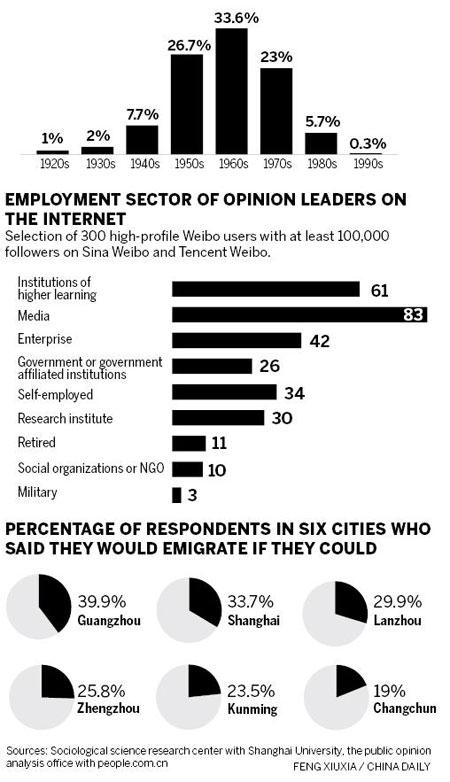
China's new media continues to be dominated by high-profile users in 2013 despite the country's campaign against online rumors, a report by a government think tank has shown.
About 300 high-profile micro-bloggers play a part in setting topics on the Internet, especially in emergency accidents and public issues, according to a report released by the Chinese Academy of Social Sciences on Thursday.
Their influence tends to exceed that of government micro blogs and traditional media, according to the report in the Blue Book of China's Society: Society of China Analysis and Forecast (2014).
"Our report found that at least one-third of high-profile users play crucial roles in the launch of some online campaigns, and another one-third play a part in it," said Shan Xuegang, deputy secretary-general of the public opinion analysis office of people.com.cn.
Shan gave the example of a campaign to rescue street children and abducted children on the Sina Weibo micro-blogging service, a Twitter-like platform in China. The campaign was promoted by a number of high-profile users including actors Yao Chen and Zhao Wei and social critic Li Chengpeng. Each online celebrity has more than 10 million followers on their micro blog.
The high-profile users also magnify grassroots voices through their reposts and thus can pose challenges to traditional media.
"Normally a micro-blogger would only have friends as their followers and their message could only be spread inside a circle. However, if the message is reposted by a high-profile user, it could be seen by thousands," Shan said.
However, the transmission power is also apt to be misused as some would repost messages without verifying their accuracy and thus help spread rumors, he said.
"Some reposts from the high-profile users concern topics that they are not familiar with, and some are without any verification," he said.

China launched the campaign against online rumors after the Supreme People's Court and the Supreme People's Procuratorate issued a guideline in August defining the criteria for convicting and sentencing offenders who spread rumors online.
Several high-profile users, including Dong Liangjie, a self-proclaimed environmental protection activist, have been detained for spreading rumors.
The campaign has been influential, with the account activity of some high-profile users decreased, Shan said.
Zhan Jiang, a communications professor at Beijing Foreign Studies University, said the Internet will continue to pose challenges to traditional media, such as newspapers and TV stations.
Shan said the research institute has also monitored a decrease in the activity of micro blog users, mainly due to challenges from other new media patterns such as WeChat, a popular voice-messaging app.
"The decline is normal, because all Internet platforms must face the challenge of users getting bored after three to four years," he said.
China has more than 331 million micro-bloggers, of which 190,000 have more than 100,000 followers and 3,300 have more than 1 million followers.
Copyright ©1999-2018
Chinanews.com. All rights reserved.
Reproduction in whole or in part without permission is prohibited.